Eleven-year-old Théo Grataloup lingers on his way home from Ponsard Middle School in the southeastern town of Vienne, 35km south of Lyon. Even with an overloaded red backpack, the sixth grader likes to wander the streets of his town, stopping to have a crêpe as a snack or finding a shop to buy a compass before going back “home” – or rather to his parents’ travel agency, specialised in horse treks. “Théo is capable of anything and everything in order to avoid doing his homework,” laughs his mother, Sabine Grataloup, delighted to finally see her son make an appearance.
With his round face and angelic smile, Théo gives no indication of the 53 surgical operations to which he’s been subjected. Only his guttural voice gives a sign of the ordeal he’s undergone since birth. Barely out of his mother’s belly in May 2007, the infant underwent an emergency operation to separate his digestive and respiratory systems, which were connected. “The first six years of Théo’s life were really complicated,” says his mother, who remembers everything about her son’s first weeks. “He was in intensive care, with his hands tied to prevent him from pulling out his intubation tube, and we couldn’t hold him in our arms. His sister and grandmothers couldn’t even come to see him,” she remembers. At the age of three months, the baby underwent a tracheotomy, which left a perforation in his throat. Although he covers the spot with a white scarf, it prevents him from taking part in any aquatic activity.
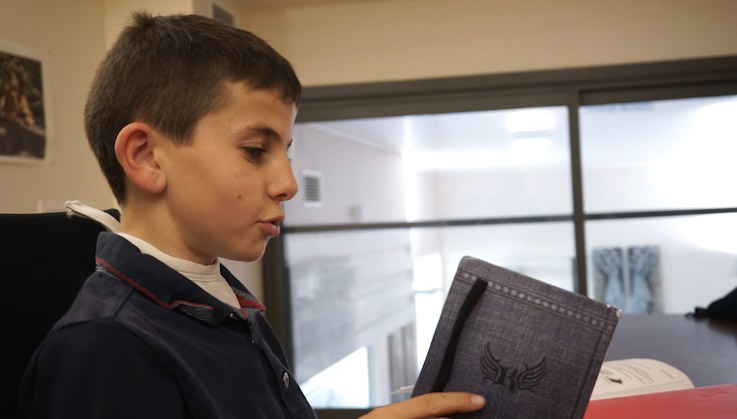
Théo suffers from type-3 esophageal atresia, a malformation of the larynx and tracheomalacia, a collapse of the airway when breathing. At the age of five months, he was finally able to leave the hyper-medicalised hospital environment and go home for the first time. But he lives under the constant surveillance of at least one of his parents, ready to intervene in case of a problem. “If his cannula [soft tube with two prongs that fit just inside the nose] became blocked, he would fall unconscious,” explains Sabine Grataloup, who stayed by her son’s side for the first three years of his life.
After that, when her son started nursery school, his mother obtained a waiver to remain just outside his classroom. “At least that way, I was out of the house and had a small table where I could work,” she says. They had to wait until Théo’s fifth birthday for his tube to be removed. The family could breathe at last.
The medical community is unambiguous: Théo’s malformations are not genetic, but definitely linked to an external factor. “Right from birth, Théo’s doctors pointed a finger at pesticides,” says Sabine, who at the time didn’t make an immediate connection to the weed killer that she used at home to spray the horse paddock. “The wake-up call came later,” she remembers. In August 2008, to be precise. Just as she did every year at the same time, Sabine treated the area with Glyper, a herbicide containing glyphosate. “It suddenly hit me; I remembered what the surgeon had told me about pesticides.” Due to the teratogenic risks of glyphosate [causing malformation of embryos and foetal abnormalities] cited in scientific studies, doctors say the link to Théo’s birth defects is “highly likely”. “I was exposed [to glyphosate] at a crucial moment in my pregnancy – during the first four weeks,” she says. “I didn’t even know I was pregnant, so I didn’t take any particular precautions.”
Even worse, Sabine knowingly chose the product. At the time, this environmentally minded mother-to-be fell for agrochemical giant Monsanto’s ad campaign promoting the merits of its product Roundup, the “first biodegradable weed killer”. Meanwhile, in 2001, the American corporation had already been sued in France for false or misleading advertising. The company, ordered to pay a €15,000 fine, appealed. The Court of Cassation [France’s supreme court of appeal] upheld the penalty two years later. “During all that time, the ad continued to be aired,” says Théo’s mother, who heard about the court case “too late”.
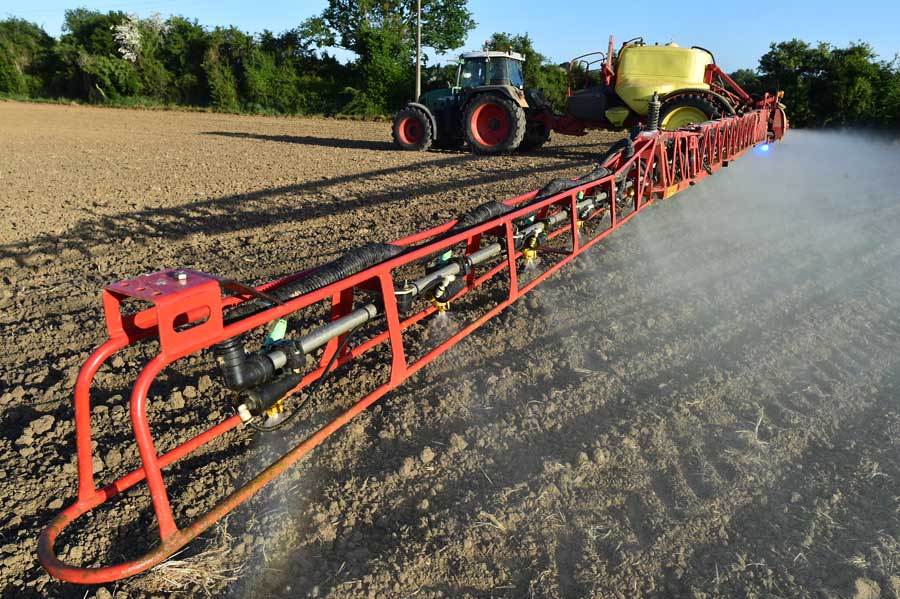
Sprayed by farmers for more than 40 years, the product presents a risk for the population, says François Veillerette, president of Future Generations, an organisation dedicated to the fight against pesticides. “Particularly for children and foetuses, which are still in full development phase,” he says. “They’re especially sensitive because glyphosate can disrupt their hormonal and endocrine systems.” Since March 2015, The World Health Organisation’s International Agency for Research on Cancer has classified the herbicide as genotoxic (damaging to DNA and causing mutations), carcinogenic to animals and a “probable human carcinogen”.
Today, exposure to glyphosate is becoming increasingly prevalent. In August 2018, a study conducted by “Sixty Million Consumers” [an independent French magazine and website focused on consumer protection] revealed that among the 12 types of baby diapers tested, one third contained traces of herbicides. One year earlier, Future Generations found herbicide traces in various food sources, such as cereals, lentils and chickpeas.
In October, 2017, the Grataloup family decided to go further by taking French company Novajardin (which distributes Glyper), as well as Monsanto, to court. What was the catalyst? The “Monsanto Papers,” a series of investigative articles that began to appear several months earlier in French daily Le Monde exploring the multiple strategies Monsanto has used to “interfere with science, influence the regulatory process and orchestrate PR campaigns to defend their products”. A court case in the United States brought to light internal Monsanto documents showing that the company had held serious doubts about the safety of its product since the early 1980s. A 1983 study noted, for example, that mice exposed to glyphosate developed a rare kidney tumour. The US Environmental Protection Agency (EPA) then declared glyphosate as a “possible carcinogen”. But Monsanto brought in a researcher “with the goal of convincing the EPA that the tumours observed in mice were not connected to glyphosate”. The herbicide subsequently received the EPA’s clean bill of health.
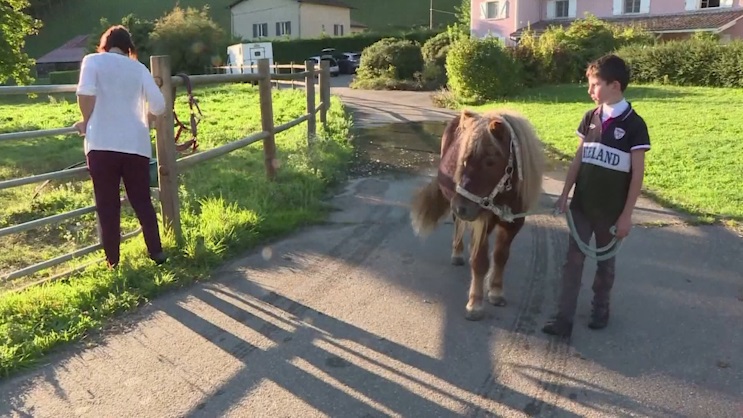
“They knew but they continued to sell the product to make money,” sums up Théo, who says he’s “angry” at the company, now owned by German pharmaceutical giant Bayer, which sells 4 billion euros worth of Roundup annually. In France, herbicides containing glyphosate make up 47 percent of the pesticide market.
The Grataloup family’s goal in bringing their case to court was to create a legal precedent that would assist other families in their situation. “Both companies need to be brought to justice in order to alert public authorities and raise awareness of the risks involved,” says Sabine.
Determined to sound the alarm on the proven dangers of this omnipresent herbicide, the Grataloup family consistently met with flat refusal from authorities, who “showed little concern for this isolated case”. And there is no such thing as a national birth defects registry in France. Six regional registration centres (Brittany, Paris, the French West Indies, Réunion Island and two in the Auvergne-Rhône-Alpes department) exist, but they only cover 19 of France’s 101 departments and 19 percent of births. “In order to understand the phenomenon, we have to be able to measure its extent,” says Sabine Grataloup.
But there is another legal procedure pending in France involving the young victims of pesticides. In Gironde in the country’s southwest, students in two primary school classes came down with headaches after pesticides were applied to the surrounding vineyards. The incident occurred on May 5, 2014 in the small village of Villeneuve-de-Blaye, an hour’s drive north of Bordeaux.
“When the kids arrived at school, a tractor was already in the process of applying the product. During recess, the children complained they did not feel well and returned inside with their teacher,” says François Ruffié, a lawyer for Sepanso, an environmental organisation that has joined the civil suit.
“When they went back out, the teacher was taken ill herself. She lost consciousness, the children were suffering from various irritations and started to cry.” Emergency Services had to intervene. “Children are the victims here, which is a serious and inadmissible matter,” says the lawyer, citing a report from the school doctor attesting to the “very likely” link between the children’s health problems and the pesticides used on the nearby vines.
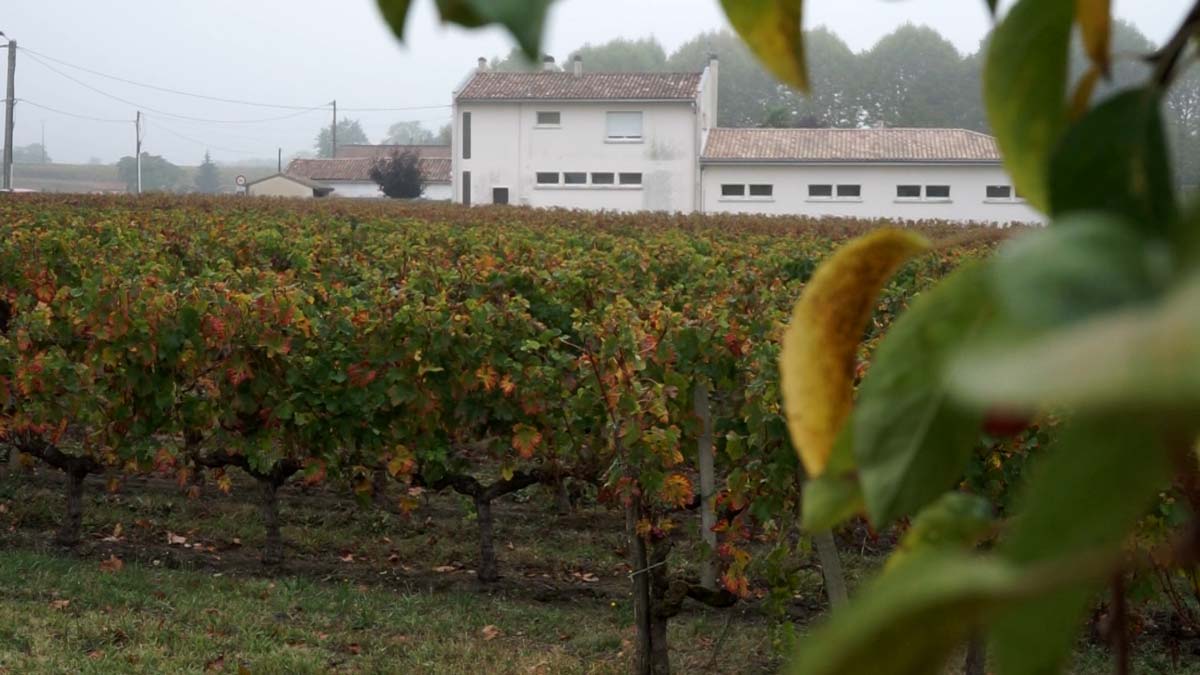
“The kids who came into contact with the fencing had the product on their hands,” says Ruffié, who recorded the testimony of a little girl, “who explains what happened using the words of a child. It’s striking”.
An investigation jointly undertaken by the gendarmerie and New Aquitaine department’s services for the protection of agriculture and forest concluded that due to the strength of the wind, winegrowers were in total breach of the law. Yet in April 2015 the matter was – at least initially – declared closed by the Libourne prosecutor.
At Sepanso’s request, the case was reopened before being dismissed two years later. The environmental organisation issued an appeal. It was successfully heard in July 2018 at the Bordeaux appeals court, which ordered the two winegrowers to appear before the Libourne correctional court. “This was good news. Children’s health and safety is a worthy subject for a trial,” rejoiced the lawyer, who is still surprised by the general absence and/or silence of the children’s parents in this matter.
In front of the Villeneuve school, several parents we met – many of whom work in the wine industry – are surprised to see that the incident has gone to trial. One mother whose daughter was at school that day even calls it, “media hype”. “My daughter saw a doctor and the test results came up with nothing,” she says. “The children got all riled up after seeing the teacher faint. Nothing more.”
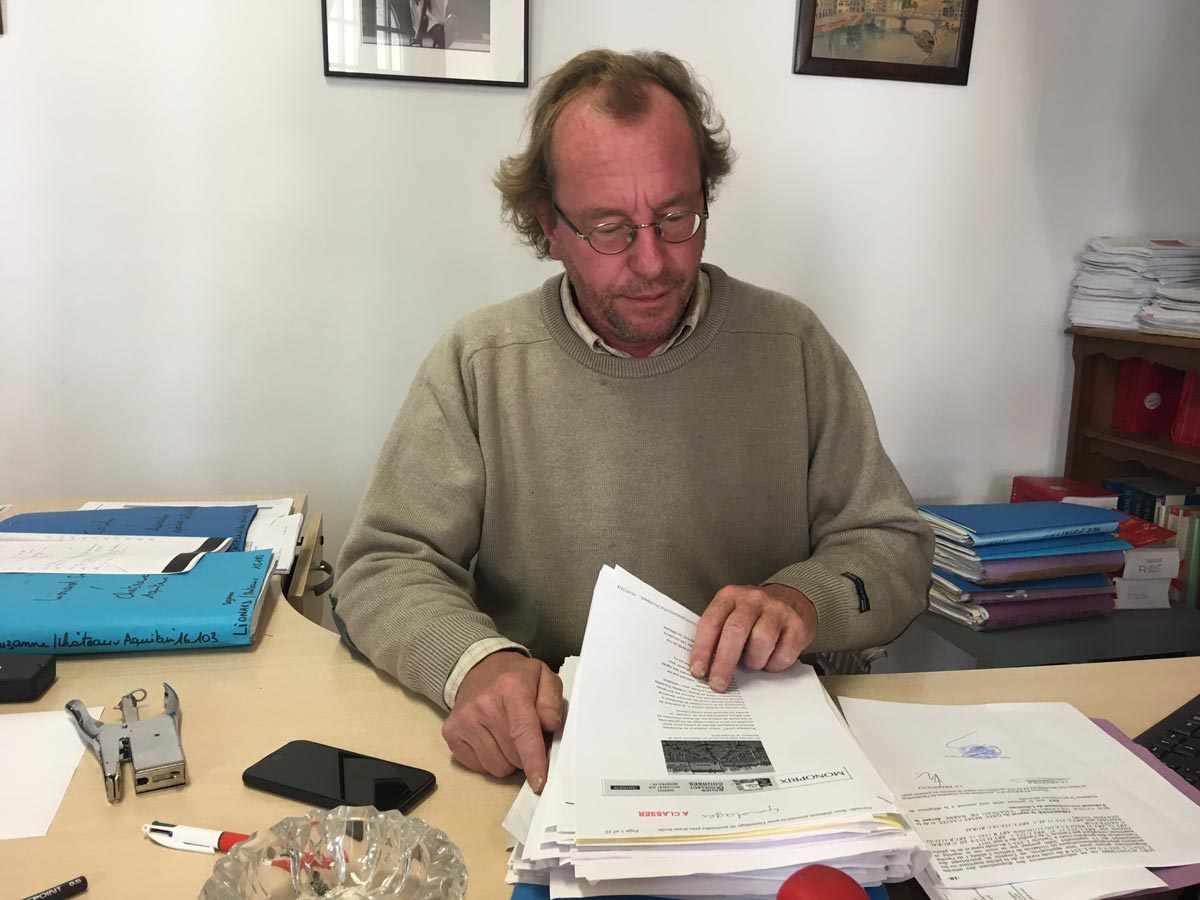
Today, faced with a number of health scandals involving Bordeaux vineyards, the agricultural council recommends that professionals spraying pesticides wear gloves, an airtight bodysuit, goggles and other protective gear in order to avoid contamination. “We’re not condemning or going after agriculture or the winemaking industry, but rather the excessive use [of these products],” Ruffié says. “We’re simply asking for the application of the law, respecting the boundaries of one’s own plot of land.”
During the four years he’s been pursuing the case, Ruffié has noticed an evolution in the mindset of winegrowers as well as governing bodies. “The discourse has changed,” he says. “Now, it’s time for our practices to follow.”
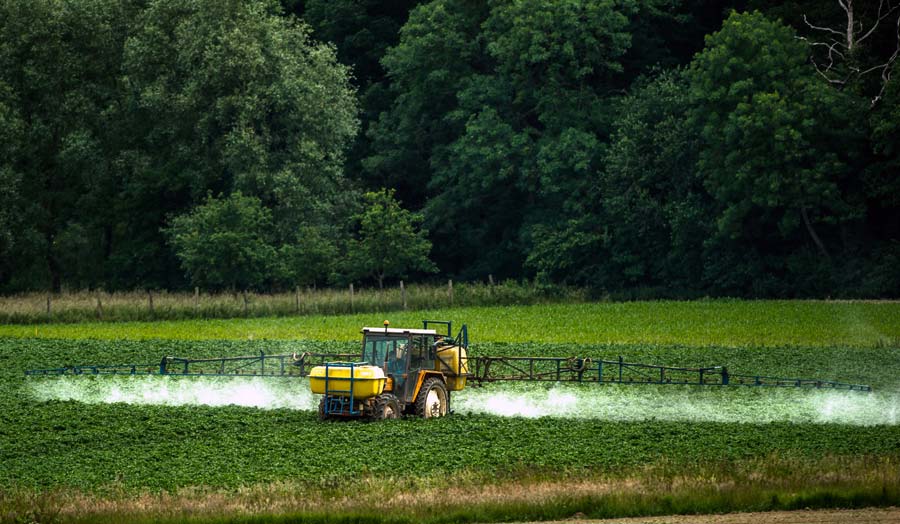
But French politicians don’t seem terribly inclined to legislate against the use of pesticides. Even though in 2017 Emmanuel Macron committed to prohibit the use of glyphosate within three years, MPs from his majority-holding LREM party have twice refused to approve an amendment that would incorporate a glyphosate ban into an existing food and agriculture law. To explain this doublespeak, François Veillerette points a finger at the “pesticide industry lobbies and the FNSEA [the main agricultural union], who used all their weight to prevent [the glyphosate ban] from being incorporated into the law” and fears that “it will not be there for a few more years.”
On this subject, Jean-Baptiste Moreau, LREM deputy for the Creuse department and rapporteur of the draft law, reaffirms the president’s pledge. “This promise will be honoured 100 percent,” he says, vowing there will be no “dirty tricks”. “But we have chosen to trust and work together with scientists and farmers in order to accompany the whole profession in the move away from glyphosate within this three-year window, step-by-step, with gradual reductions,” he says. “Writing [the glyphosate ban] into the [existing] law is not a guarantee of its effectiveness. What is effective, is giving ourselves the means to achieve our goals.”
Sandrine Grataloup, for one, does not understand this position, which she sees as “a breach of trust”. “When the whole population is exposed to a product that is known to be dangerous, how can it not be banned? The government is not protecting us.”
Must we wait until France becomes, like Argentina, the scene of a “silent genocide”? This was the terminology used by organisations representing pesticide victims during the International Monsanto Tribunal, which took place in October 2016 at The Hague. For two days, five judges from around the world heard testimony on the effects of glyphosate from approximately thirty witnesses: experts, victims, lawyers. Monsanto refused to be represented. Although the tribunal carried no official recognition, its aim was to move international law forward.
At the end of the proceedings, the court, under former European Court of Human Rights judge Françoise Tulkens, rendered its advisory opinion – which had no sentencing power in the legal sense of the term – asking for the term “ecocide” (destruction of the natural environment) to be recognised under international law.
“It was then that I understood we were not alone,” says Sabine Grataloup, who was able to testify alongside Argentines also affected by pesticides. In that country, where two-thirds of agricultural land is devoted to growing genetically modified soybeans and corn and where 240,000 tonnes of herbicides containing glyphosate are used each year – compared with 10,000 tonnes in France – the damage to public health is considerable: deformities are four times as high and childhood cancers are five times what they were before the days of glyphosate.
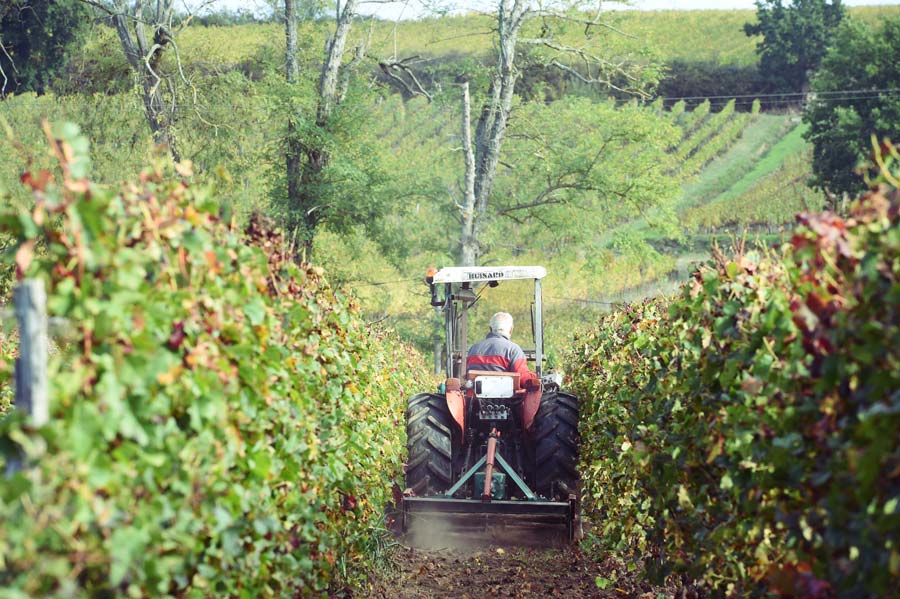
With this in mind, the organisation Future Generations is calling for a restructuring of our agricultural system currently based on the intensive use of pesticides, believing that only a popular movement can apply the necessary pressure on politicians. “We want to return to a form of agriculture more respectful of the environment, nature and our health,” says François Veillerette, co-author of the book, “We Want Our Poppies Back” [the red wildflowers, now becoming rare, once grew widely near agricultural fields].
With the publication of this work in September 2018, a movement bearing the same name was born, as well as a petition that has already garnered almost 350,000 signatures. Its goal: gather citizens in front of every town hall in the country the first Friday of every month. In Paris’s 19th arrondissement (district), the first meeting brought together a hundred or so people, most of whom were wearing poppies made from red paper. “As citizens, we need to make our voices heard so that our leaders become aware of the size of the problem,” said one demonstrator, Aurélie Le Floch, who was attending with her 7-year-old daughter. “The battle begins today; it’s never too late.”
In the midst of the crowd, the president of Ecology Generation [one of the country’s four green parties] and former ecology minister Delphine Batho sees this kind of group mobilisation as “the only way to combat the collective power of the lobbies, of conservatism, and the inertia of government authorities”. This MP from the Deux-Sèvres department – who last May wrote the initial amendment to ban glyphosate that was subsequently rejected – wants to believe in the strength of civil society, as was shown to be the case with the law banning neonicotinoids [pesticides that kill bees] in 2016. “In fact, we got this bill through because MPs won the battle at the National Assembly, but there were also 700,000 citizens who mobilised” [by signing several petitions].
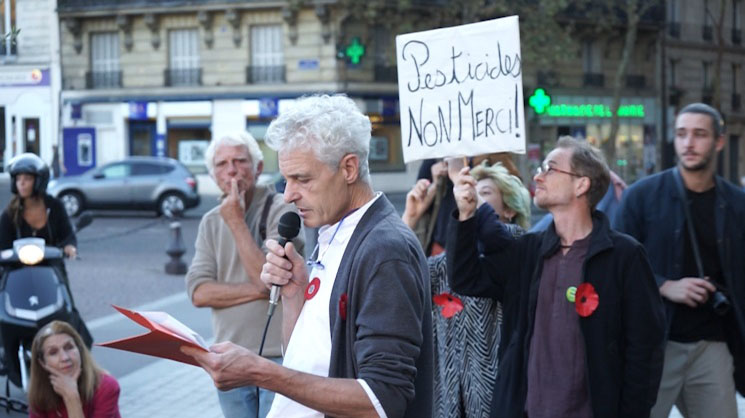
In addition, she hopes that this mobilisation effort will force the French government to yield on the question of glyphosate. “Nothing has been decided and it’s becoming unbearable,” she concludes. But Olivier Mugler, the rally’s coordinator, goes even further: “We must eradicate all pesticides, because if we fight them molecule by molecule, one will just replace another like an familiar refrain…”, he argues, determined the movement will succeed thanks to monthly citizens’ demonstrations that will be kept up for the next two years.
As for the Grataloup family, they support the popular movement: “We’ll do it for our kids,” says Sabine, who, ever since the birth of her son Théo, can’t get Jean-Paul Jaud’s film, “Nos Enfants Nous Accuseront” out of her head [The film’s first title in English, “That Should Not Be: Our Children will Accuse Us” has since been changed to, “Food Beware: The French Organic Revolution”]. “The title is pretty much all that keeps me going. I wasn’t able to protect Théo in-vitro,” Sabine says. “I don’t want him to one day accuse me of not having been able to protect other children.”
